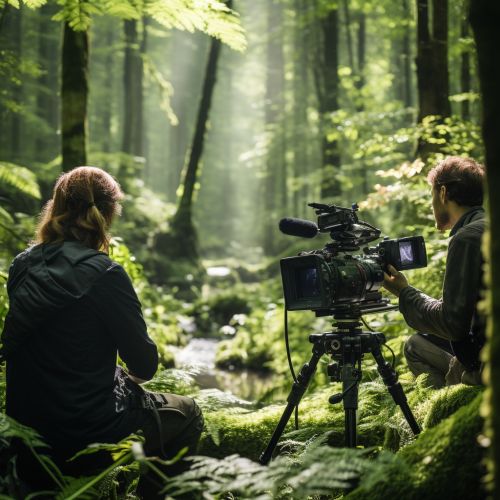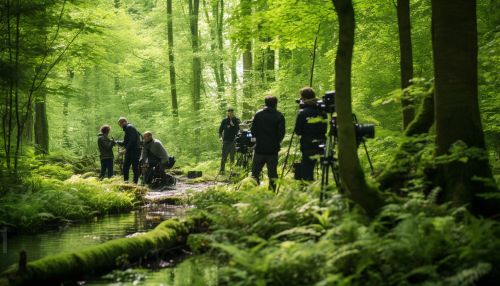Nature documentary
Overview
A nature documentary or wildlife documentary is a genre of documentary film or television series that primarily focuses on the depiction and interpretation of natural habitats, wildlife, and their interactions. These documentaries aim to provide viewers with a deeper understanding of the natural world, often highlighting the beauty, complexity, and fragility of our planet's ecosystems.


History
The history of nature documentaries dates back to the early 20th century, with pioneers like Cherry Kearton and his brother Richard, who were among the first to use newly developed portable movie cameras to capture wildlife in their natural habitats. The genre gained significant popularity in the mid-20th century, with the advent of television and series like Zoo Quest and Wild Kingdom.
Production
The production of a nature documentary involves extensive planning, research, and often, considerable time spent in the field. Filmmakers must have a deep understanding of the natural world and the specific ecosystems they are documenting. They must also possess technical skills in cinematography, sound recording, and often, specialized techniques such as underwater or aerial photography.
Narration and Storytelling
Narration is a crucial element in nature documentaries. The narrator guides the viewer through the film, providing context, explaining scientific concepts, and often, telling a compelling story about the animals or ecosystems being featured. Storytelling in nature documentaries can range from a simple observational style, where the behavior of animals and nature speaks for itself, to more complex narratives that weave together multiple interconnected stories.
Impact and Influence
Nature documentaries have a significant impact on public awareness and understanding of the natural world. They have the power to inspire, educate, and often, advocate for conservation and environmental causes. However, they also raise ethical questions about the portrayal of nature and the impact of human intervention on the subjects being filmed.
Criticisms and Controversies
Despite their popularity and influence, nature documentaries have faced criticism and controversy. Some critics argue that they often present a romanticized view of nature, avoiding the harsh realities of predation, death, and survival. Others have raised concerns about staged scenes, manipulative editing, and the potential for disturbance to wildlife during filming.
Future Trends
The future of nature documentaries is being shaped by technological advancements, changing viewer expectations, and an increasing emphasis on conservation and environmental issues. Innovations in camera technology, such as drones and remote-operated cameras, are allowing filmmakers to capture footage in ways that were previously impossible. At the same time, the genre is evolving to address pressing environmental issues, such as climate change, habitat loss, and species extinction.
